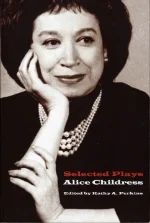Trouble in Mind (1955)
by Alice Childress
A surprisingly strong play, and quite a bit different from what I expected. I guess I expected a lesser version of A Raisin in the Sun, but this play is a comic take on race relations and double consciousness as exemplified through theater rehearsal. I say comic because that's the general tenor until you get near the end and the serious heart of the matter emerges.
One pretty exciting thing is that the cast is mixed race and that is just too infrequent. It does bear some resemblance to one of the only other mixed-race plays done here in recent memory: Clybourne Park, what with the farcical roles and antics associated with interracial relations, black people playing the servile role to unconsciously-privileged whites, white people struggling to be cool or chummy with African-Americans who play along but only allow it to go so far, and the straight talk when each is with their "own." This makes for a good comedy, especially since the essential dance or conflict is still well – understood and so often rehearsed. It is a performance that we refuse to let close, culturally, because new actors are constantly arising in taking on the roles practiced by their models/kind/people. There is most certainly movement and transcendence among individuals (even as the play allows for with the possibility of love between Judy and John), and yet the farce, the tragedy continues on the systemic level. Pockets heal, but the disease prevails.
Wiletta seems to be the central character, protagonist to Manner's antagonist, though the parts are not good and evil. Wiletta is the long time lover of the stage, as we see with her opening reverence for the empty stage she enters. She is dedicated to the proposition of being an actor, finds her grace in the adoption of roles, even if they are less than ideal. She advocates a real world attitude to emerging actors, a thespian double consciousness, and yet she herself is tested by the play she is cast in. She is tested by a plot that makes no sense about characters whose motivations are irrational, because the audience and the writer are unwilling to ascribe any heroic virtues beyond victimhood to African-American characters. At the center of the internal story is Job, who is eventually lynched because he tried to vote in the south. John plays this role. John is an upcoming/rising star, a young charismatic actor who falls right in line with the wishes of the director, even adopting his mannerisms, a blank slate, lump of clay awaiting his molding, his assimilation…

